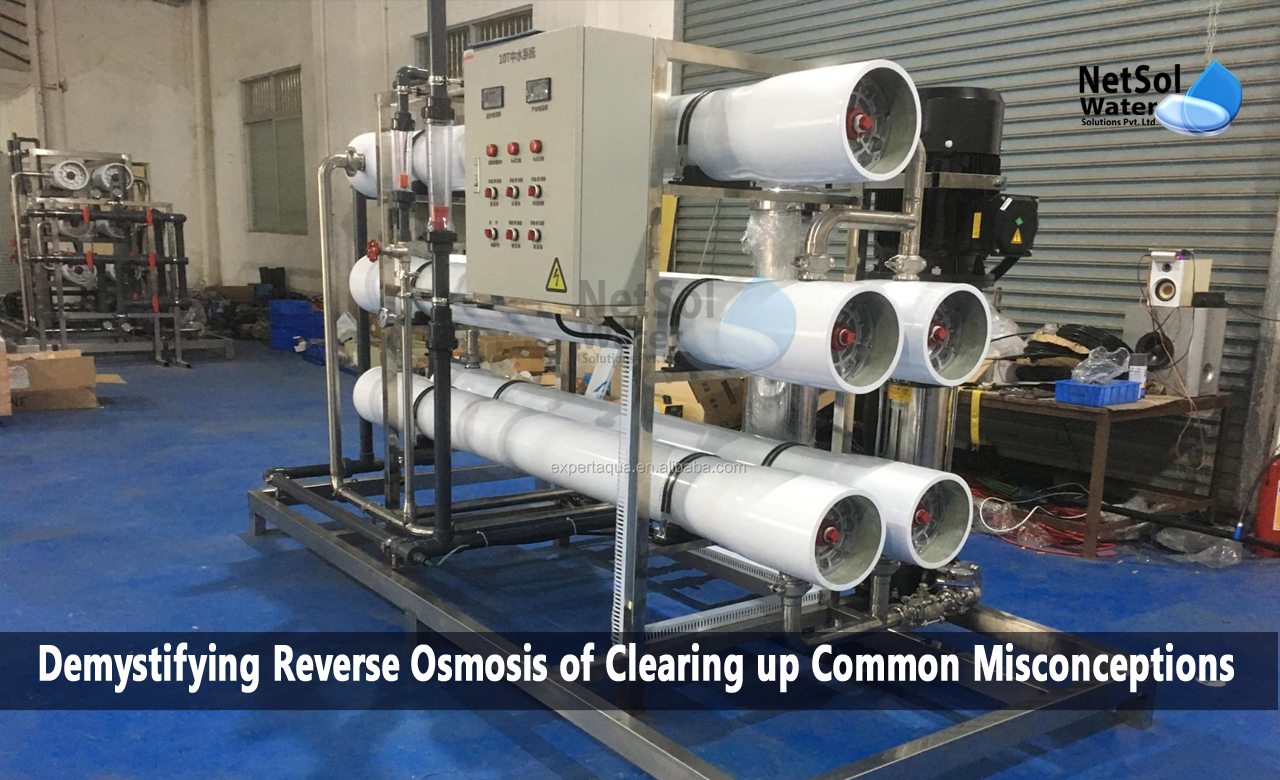Demystifying Reverse Osmosis of Clearing up Common Misconceptions
Reverse osmosis (RO) is a widely used water purification method that has gained popularity in recent years. Its ability to effectively remove contaminants and provide clean, safe drinking water has made it a go-to choice for many households and businesses. However, despite its effectiveness and widespread use, there are several misconceptions surrounding reverse osmosis that can lead to confusion among consumers.
In this blog, we aim to demystify reverse osmosis by addressing and clarifying some of the most common misconceptions associated with this water treatment technology.
In today's world, where water quality is a growing concern, understanding the truth about reverse osmosis can help individuals make informed decisions about their water filtration needs. By dispelling myths and shedding light on the facts, we hope to provide a comprehensive and accurate understanding of reverse osmosis and its benefits.
-
Myth: Reverse osmosis removes all minerals from water.
One prevalent misconception is that reverse osmosis systems strip water of essential minerals, leaving it devoid of nutritional value. However, this is not entirely true. While reverse osmosis does remove a significant portion of dissolved minerals, it is not a complete elimination. RO systems are designed to primarily remove harmful contaminants, including heavy metals, chemicals, and bacteria, while allowing some beneficial minerals to pass through. It is important to note that minerals are abundant in our daily diet, and relying solely on water as a source of minerals is not necessary.
-
Myth: Reverse osmosis wastes a lot of water.
It is often assumed that reverse osmosis systems waste substantial amounts of water during the filtration process. While it is true that RO systems generate wastewater, modern advancements have made significant strides in minimizing water waste. Many RO systems incorporate innovative technologies such as permeate pumps and water-saving features, reducing the ratio of wastewater to treated water. Additionally, the rejected water can be repurposed for non-potable uses, further reducing wastage and promoting sustainability.
-
Myth: Reverse osmosis removes all impurities in a single pass.
Although reverse osmosis is highly effective at removing many contaminants, it may not eliminate all impurities in a single pass, especially when dealing with high levels of certain contaminants. Multiple stages of filtration, including pre-filters and post-filters, are often employed in RO systems to enhance the removal efficiency and ensure the production of high-quality water. This multi-stage approach helps to provide a thorough and comprehensive filtration process, improving the overall water quality.
-
Myth: Reverse osmosis makes water acidic.
Another common misconception is that reverse osmosis makes water acidic, leading to potential health issues. However, the pH of water treated by reverse osmosis depends on the source water's initial pH level. RO systems do not have a significant impact on the pH, and any slight changes can be easily adjusted with post-treatment methods if necessary. It is essential to understand that maintaining a balanced pH level is crucial for optimal health, and the pH of drinking water can be adjusted to achieve the desired range.
-
Myth: Reverse osmosis is the best water filtration method for everyone.
While reverse osmosis is an excellent water filtration method, it may not be suitable for every situation. Factors such as water quality, specific contaminants, and individual preferences play a role in determining the most appropriate filtration system. It is essential to consider factors like water source, desired water quality, and maintenance requirements before choosing a water treatment solution. Consulting with water treatment professionals can help assess individual needs and recommend the most suitable filtration system.
Conclusion:
Reverse osmosis is a powerful water purification technology that provides clean, safe, and great-tasting drinking water for millions of people worldwide. By debunking common misconceptions surrounding reverse osmosis, we have aimed to provide a clearer understanding of this water treatment method. It is crucial to approach information about water filtration with a critical mindset, separating facts from misconceptions to make informed decisions.
Understanding the capabilities and limitations of reverse osmosis empowers individuals to choose the most appropriate water filtration solution for their specific needs. Whether it's for a residential household, a commercial establishment, or even an industrial application, knowing the truth about reverse osmosis can help ensure the selection of the most effective and efficient water treatment system. Remember to consider your unique needs, consult with professionals, and prioritize reliable information to make well-informed choices regarding your water quality and health.
Netsol Water is Greater Noida-based leading water & wastewater treatment plant manufacturer. We are industry's most demanding company based on client review and work quality. We are known as best commercial RO plant manufacturers, industrial RO plant manufacturer, sewage treatment plant manufacturer, Water Softener Plant Manufacturers and effluent treatment plant manufacturers. Apart from this 24x7 customer support is our USP. Call on +91-9650608473, or write us at enquiry@netsolwater.com for any support, inquiry or product-purchase related query.



